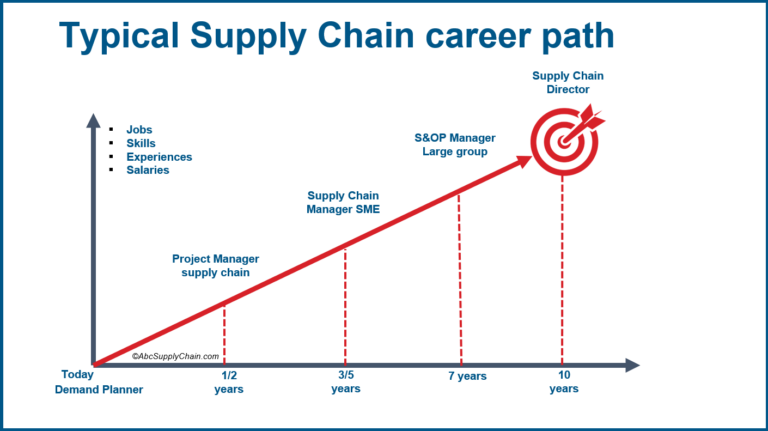Supply Chain Careers: Opportunities and Growth in the Field
Table of Contents

- jaro education
- 20, December 2023
- 11:32 am
Supply chain management is a crucial part of today’s business landscape. Supply chain careers have become a magnet for professionals seeking dynamic and rewarding opportunities in diverse industries. The magnified interest of professionals in careers in the field is due to the chance it provides to master the intricate art of supply chain management, becoming indispensable architects of seamless and efficient business operations.
Understanding Supply Chain Management
Imagine a busy city where businesses are like big puzzles, and everyone’s trying to make sure they have all the right pieces at the right time. In this lively place, workers from different jobs are working hard to keep up with what people want. This is where supply chain management comes in. It’s like being the conductor of an orchestra, making sure everything runs smoothly.
To be precise, Supply chain management entails planning, organising, and overseeing the movement of raw materials and products from their source right to the consumer. This entails purchasing goods or services, making them, keeping stock, shipping, distributing, and servicing customers. All companies which deal with quality, cost-effectiveness and delivery of their product or service must have a supply chain.
Supply chain management job opportunities are many as it is a diversified area. No matter whether your interest lies in logistics, operations, analytics, purchasing or sales, there is a rewarding and challenging career waiting for you in supply chain management.
Benefits of Supply Chain Careers
Supply chain careers have many advantages, such as:
High demand
Supply chain professionals have high demands in many industries like manufacturing, retail, e-commerce, healthcare, and so on. The logisticians who analyse and coordinate goods are among the fastest growing occupations in the U.S. Bureau of Labor Statistics, with an estimated increase of 18% from 2022 – 2032. The employment of purchasing managers, buyers, and purchasing agents, who oversee the buying of goods and services for organisations, is projected to decline by 6% in the same period. These are just some examples of the many supply chain management job opportunities available in the market.
Competitive salary
Some well-experienced professionals get higher pay commensurate with their education, experience and other factors like location, among others. According to PayScale, an average Indian supply chain manager earns INR 973,586 annually, average monthly income for a logistics analyst is INR 40,797 and average monthly salary for Indian buying managers is 26823.00.
Career advancement
For supply chain professionals to develop their functions, they need to acquire specific elements of the supply chain. This implies that they can also register for a course, acquire certification or specialise themselves to enhance their skills and qualifications.
Variety and challenge
Supply chain managers have several daily tasks and interesting challenges they get to work with every day. They interact across the supply chain with different people, goods, and processes. Furthermore, they can handle and resolve challenging problems such as inventory control, best transportation, minimising waste, improved customer satisfaction, etc.
Skills Needed for Supply Chain Careers
Supply chain professionals need a range of skills to succeed in their careers, such as:
Analytical skills
In the supply chain, professionals must be able to analyse data and information to provide quality solutions and recommendations. To collect, organise and interpret data, they need to use different techniques like spreadsheets, databases and software, among many other tools or methods. The managers should also assess the results and effectiveness of the supply chain processes and activities.
Communication skills
Effective communication entails discussing issues with suppliers, customers, managers and fellow employees who form part of supply chain professionals. The language needs to be straightforward, precise and forceful for this information. They should be able to listen carefully, ask questions and give a response to the demands and wishes of other people.
Organisational skills
The supply chain requires that the supply chain professionals coordinate the supply chain process. They must develop plans, prioritise actions, and complete tasks and projects within the allocated time, costs, and quality standards. In addition, these entities involve coordination and proper utilisation of resources, for example, materials, machinery, and employees.
Problem-solving skills
Professionals involved in supply chain management must discover and remove the problems that surface in the supply chain. Thus, they require critical reasoning abilities, ingenuity as well and creativity coupled with innovative methods for the generation of solutions or workable alternatives. Finally, their roles involve foreseeing possible hazards and implementing corrective as well as preventative measures.
Roles in Supply Chain Careers
The supply chain profession has a range of jobs for people from different levels of education, experience and interests. Some of the common roles in supply chain careers are:

*abcsupplychain.com
Purchasing agent
The purchasing agent is responsible for buying goods and services for an organisation. They carry out vendor research and evaluation, price and contract negotiation, order placing, and delivery monitoring. They keep records and reports of buyouts and transactions. A purchasing agent must hold at least a bachelor’s degree in business, supply chain or a related field and have some relevant experience in purchasing or procurement.
Operations manager
The responsibility of an operations manager is to supervise the production, transportation, and quality assurance of goods and services. The operations team is also guided by goals, policies, and procedures, which are set and monitored by this department. A bachelor’s degree in business, supply chain management or similar fields coupled with several years in operations/management is typically enough for an operations manager.
Logistics analyst
The role of a logistics analyst entails analysing and improving the logistics processes of an organisation. They collect and interpret data on how people move the goods and services. They also determine ways and suggest improvements to reduce costs, increase efficiency, and ensure client satisfaction. A logistics analyst must have a bachelor’s degree in business, supply chain management, or a related discipline with some experience in logistics or analytics.
Purchasing manager
One of the managers in an organisation is the purchasing manager, who is supposed to lead and supervise the purchasing activities. They make purchasing strategies, policies, and standards, which they put into effect. They also take care of the performance, relationships, evaluation, and management of the suppliers, vendors, and other representatives. The purchasing manager requires a degree in business, supply chain management or a field related to several years of experience in purchasing or management.
Supply chain manager
A supply chain manager is a person who has to make a plan and organise an entire chain of supply that belongs to a company. They also develop and implement supply chain strategies, processes and systems. With that, they control and coordinate the supply chain operations, which include purchasing, manufacturing, inventory, transport, and distribution. One must acquire a master’s degree in business management or supply chain management and have more than three years of experience as a supply chain person or manager.
Tips for Pursuing Supply Chain Careers
If you are interested in pursuing a career in supply chain management, here are some tips to help you:
Pick a relevant area of specialisation and course
Pursue a bachelor‘s, master‘s, or doctoral program in supply chain management or a relevant field such as business, engineering, or economics. Alternatively, you could opt for an online course/programme, for example, Executive Certificate Program in Supply Chain Analytics and Management by IIM Mumbai, for basics and advanced concepts on supply chain management.
Gain relevant experience and skills
Internships, project works, or volunteering activities can be done for organisations or even functions that relate to supply chain management. Moreover, you can become a member of professional organisations like the ISM and the CSCMP, where you can be updated on the latest issues concerning the industry and link up with other supply chain executives.
Seek certification or specialisation
Getting certified or specialised in supply chain management could also add value to your qualifications. Additionally, you can specialise within an industry or function like healthcare, ecommerce, or analytics.
Keep updated and informed
Reading books, journals, blogs, and newsletters will help you be knowledgeable about the recent supply chain management trends and prospects. You could also consider participating in webinars, workshops, seminars, or conferences just to listen to the experts or your peers on top of it.
Build your network
Supply chain professionals are expected to exhibit networking as one of the essential skills in their careers. Networking enables learning from others’ experiences, insights, and advice. Also, you will unveil new prospects of getting referrals, leads, or partners. Networking begins after you attend various events, become a member of social media sites, find yourself a mentor, and maintain friendly relations with those you interact with on a daily basis.
Stay updated and informed
The supply chain management world, as an evolving industry, necessitates continuous development and readjustment. You should keep yourself up-to-date with current trends in the market. This can be achieved through different means, such as reading books, journals, blogs, and newsletters, among others. Online courses and programs are also available. SeaRates is an effective tool that offers real-time tracking and analysis of the international supply chain and logistics market.
Conclusion
Supply chain careers provide lucrative and interesting opportunities for people who want to make a meaningful contribution to the business sphere. Pursuit of specialised training, a degree plus certification for supply chain skills will enable you to obtain the right knowledge and skills necessary for proper functioning. Different other industries and functional areas such as purchase, operations, logistics, and analytics can also be looked at.
You may consider IIM Mumbai’s Executive Certificate Program in Supply Chain Analytics and Management if you want to take it a notch higher with your supply chain career. This is a contemporary model of supply chain, embracing digitalisation, auto mechanisation, and robustness. This is an opportunity that you should take advantage of to improve your supply chain so that you can achieve your career goals. Visit the Jaro Education website for additional information on the program.









